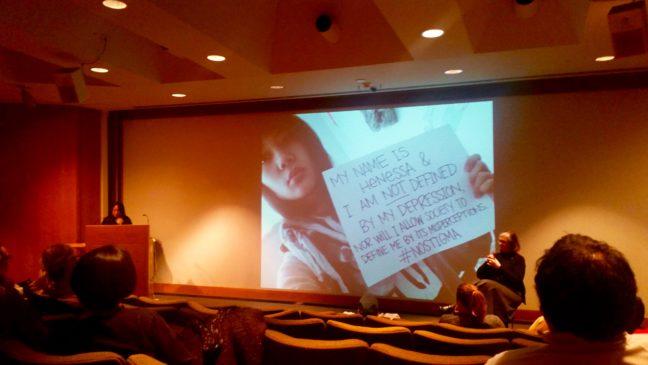With the hopes of showcasing mental health struggles faced by marginalized communities, Dior Vargas, a Latina mental health activist, shared her personal experience with depression to a crowd of University of Wisconsin students as part of a mental health lecture.
The Thursday event, titled “The Intersectionality of Mental Health,” focused on the absence of minority representation in mental health issues. The event, sponsored by the Multicultural Student Center and University Health Services, is part of the ongoing Social Justice Speaker Series.
Growing up Latina affected her journey with depression, Vargas said. Typically, it is not common to express problems of mental illness within her respective community.
“No matter where you come from, there are going to be negatives and positives,” Vargas said.
At a young age, Vargas’ parents separated, which led to her first suicide attempt.
When Vargas began high school, she started to search for the source of her troubles and ended up ordering a book on depression — what she called a “first step” in her recovery process. The second step included talking to a counselor for several weeks and then starting medication.
Though she had to struggle alone for a long time, later on, Vargas said she found she could help others by becoming a mental health activist and even a volunteer crisis counselor.
“In silence, there is a sense of dignity that is misplaced,” Vargas said.
While at first she felt she could not talk to her family about her mental health struggles, Vargas said she still wanted to keep her family involved and continued to talk to her family about them.
Surprised by the lack of access to help in her own community and the absence of people of color in the mental health care industry, Vargas said she sought to help others gain representation in the discussion of mental health.
In her photo series, the “People of Color and Mental Illness Project,” she captures images of people of color struggling with a variety of issues, ranging from depression to anxiety.
The project aims to increase awareness of minorities with mental health issues.
“I just hope that from there, we can evolve into them getting the help that they need,” Vargas said.
Currently, the project features photos of 35 different individuals holding up signs with their names and their respective mental health struggle. Each message ends with #NoStigma or #EndTheStigma.
Since not everyone has access to the internet, Vargas hopes to one day publish a book of the photos and showcase them in a gallery to reach a broader audience.
“Mental illness doesn’t discriminate,” Vargas said. “People do.”


